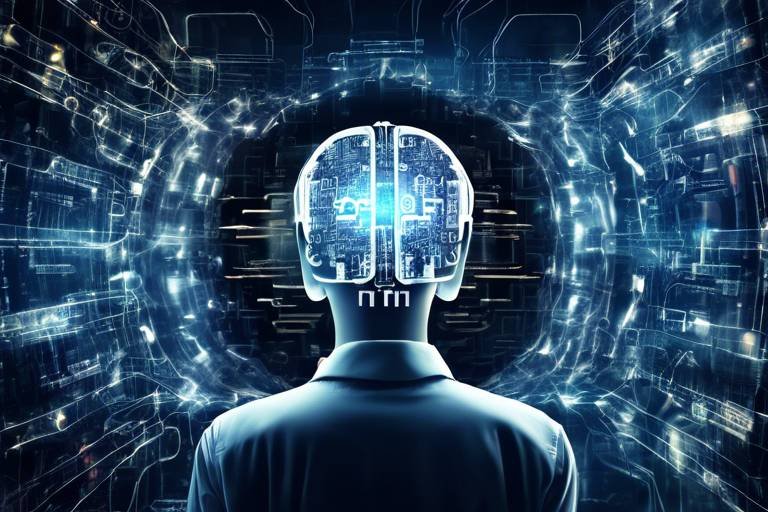Role of AI in Advancing Precision Medicine
Artificial Intelligence (AI) is not just a buzzword; it's a game-changer in the realm of healthcare, particularly in the exciting field of precision medicine. Imagine a world where medical treatments are as unique as your DNA. That's the promise of precision medicine, and AI is the powerhouse driving this revolution. By harnessing vast amounts of data, AI technologies are reshaping how we diagnose, treat, and manage diseases, leading to improved outcomes for patients everywhere.
So, what exactly is precision medicine? At its core, it tailors medical interventions to the individual characteristics of each patient. This is a far cry from the traditional "one-size-fits-all" approach that has been the norm for decades. With precision medicine, healthcare providers can consider factors such as genetics, environment, and lifestyle, allowing for more accurate diagnoses and personalized treatment plans.
The integration of AI into this paradigm is nothing short of transformative. For instance, AI algorithms can analyze medical images and patient data at lightning speed, identifying patterns that might be invisible to the human eye. This capability not only enhances diagnostic accuracy but also accelerates the speed at which conditions are detected and treated. Think of AI as a super-sleuth, sifting through mountains of data to uncover hidden insights that can save lives.
Moreover, AI's role doesn't stop at diagnostics. It extends into treatment personalization, where machine learning models can predict how individual patients will respond to specific therapies. This means that instead of guessing which treatment might work best, healthcare providers can rely on data-driven insights to make informed decisions. It’s like having a personalized health coach that knows your body better than you do!
However, as with any technological advancement, the rise of AI in precision medicine comes with its own set of challenges. Issues such as data privacy and algorithmic bias are at the forefront of discussions among healthcare professionals and ethicists alike. Ensuring that patient data is used responsibly and that algorithms are fair and unbiased is crucial for maintaining trust in these innovative technologies.
In summary, AI is playing a pivotal role in advancing precision medicine by enhancing diagnostics, personalizing treatment, and ultimately improving patient outcomes. As we continue to explore the potential of AI in healthcare, the future looks promising, but it’s essential to navigate the ethical challenges that accompany these advancements. The journey toward a more precise and personalized approach to medicine is just beginning, and AI is leading the way.
- What is precision medicine? Precision medicine is an innovative approach to treatment that takes into account individual differences in patients' genes, environments, and lifestyles.
- How does AI improve diagnostics? AI improves diagnostics by analyzing large datasets quickly and accurately, identifying patterns and anomalies that can lead to early disease detection.
- What are the ethical concerns regarding AI in healthcare? Ethical concerns include data privacy, patient consent, and algorithmic bias, which can lead to unequal healthcare outcomes.
- Can AI predict treatment responses? Yes, AI can analyze patient data to predict how individuals will respond to specific treatments, allowing for more personalized healthcare strategies.

Understanding Precision Medicine
Precision medicine is like tailoring a suit just for you, rather than grabbing one off the rack that may not fit quite right. It’s a revolutionary approach in healthcare that focuses on customizing medical treatment to the unique characteristics of each patient. This means that instead of the traditional one-size-fits-all methods, where treatments are designed based on the average patient, precision medicine takes into account factors such as genetics, environment, and lifestyle. By doing so, it aims to provide more effective treatments and improve patient outcomes.
The principles of precision medicine are rooted in the understanding that each individual is different, and thus, their medical needs can vary significantly. For instance, what works for one person might not work for another, even if they have the same condition. This approach not only enhances treatment efficacy but also minimizes the risk of adverse reactions, which can occur when patients receive standard treatments that are not suited to their personal health profiles.
One of the major benefits of precision medicine is its potential to improve diagnostics. By leveraging advanced technologies and data analysis, healthcare providers can identify diseases at much earlier stages, which is crucial for conditions like cancer where early intervention can significantly alter the prognosis. Moreover, precision medicine encourages a more proactive approach to health, emphasizing prevention and personalized care over merely responding to illness.
In contrast to traditional methods, precision medicine utilizes a wealth of data. This data can come from various sources, including genomic sequencing, which analyzes an individual's DNA to identify mutations that may affect their health. Additionally, electronic health records (EHRs) provide insights into a patient's medical history, treatments, and outcomes. By integrating these diverse data sources, healthcare professionals can create a comprehensive picture of each patient, leading to more informed decision-making.
However, the journey towards fully realizing the potential of precision medicine is not without its challenges. For instance, the sheer volume of data can be overwhelming, and ensuring that it is analyzed accurately and ethically is paramount. Furthermore, there are ongoing debates about the accessibility of personalized treatments and whether they can be made available to all patients, regardless of socioeconomic status. The goal is to ensure that everyone can benefit from these advancements, making healthcare not just more effective, but also more equitable.
In summary, precision medicine represents a significant shift in how we approach healthcare. By focusing on the individual rather than the average, it opens the door to more effective and personalized treatments that can lead to better health outcomes for everyone. As we continue to explore this exciting field, the integration of technologies like artificial intelligence will undoubtedly play a critical role in shaping the future of medicine.

The Impact of AI on Diagnostics
Artificial Intelligence (AI) is revolutionizing the field of diagnostics, and its impact cannot be overstated. Imagine walking into a doctor's office and having your medical history, symptoms, and even genetic information analyzed in seconds, leading to a precise diagnosis. Sounds futuristic, right? Well, it’s happening now! AI technologies significantly improve diagnostic accuracy and speed, allowing healthcare professionals to make informed decisions faster than ever before. By harnessing the power of machine learning algorithms, AI systems can sift through vast amounts of medical data, identifying patterns that would take humans much longer to recognize.
One of the most exciting aspects of AI in diagnostics is its ability to analyze medical images. Think of a radiologist who spends hours interpreting X-rays or MRIs. With AI, this process becomes much more efficient. Advanced algorithms can detect anomalies in images, such as tumors or fractures, with remarkable accuracy. For instance, studies have shown that AI systems can match or even exceed the performance of trained radiologists in certain tasks. This not only speeds up the diagnostic process but also reduces the chances of human error.
At the core of this transformation are machine learning algorithms. These algorithms are designed to learn from data, improving their performance over time. They analyze historical patient data, medical literature, and clinical outcomes to identify patterns that assist in diagnosing complex medical conditions. For example, when a patient presents symptoms that could indicate multiple diseases, AI can compare those symptoms against a vast database of cases to suggest the most likely diagnosis. This capability is particularly beneficial in cases of rare diseases, where human experience may be limited.
AI systems utilize a variety of data sources to enhance diagnostic accuracy. Among these are electronic health records (EHRs), which contain comprehensive patient histories, treatment plans, and outcomes. Additionally, genomic data provides insights into individual genetic predispositions to certain diseases. By integrating these diverse data sources, AI can create a more holistic view of a patient's health, leading to better-informed diagnostic decisions. For example, a patient with a family history of a particular illness may be flagged for early screening, potentially catching the disease in its early stages.
However, despite these advancements, challenges remain in the realm of AI diagnostics. Issues such as data privacy and algorithm bias pose significant hurdles. For instance, the use of sensitive health data raises concerns about how that information is stored and shared. Patients need to trust that their data is being handled responsibly. Additionally, algorithm bias can lead to disparities in healthcare outcomes. If an AI system is trained on a non-representative dataset, it may not perform equally well for all demographic groups. This highlights the need for ongoing scrutiny and improvement of AI systems to ensure fairness and equity in healthcare.
In summary, AI is making waves in the diagnostic landscape, enhancing accuracy and efficiency like never before. As we continue to embrace these technologies, it’s crucial to address the challenges they present, ensuring that the benefits of AI in diagnostics are accessible to all patients. The future of healthcare is bright, and with AI at the helm, we are on the brink of a new era in medical diagnostics.
- What is the role of AI in diagnostics? AI enhances the speed and accuracy of diagnosing medical conditions by analyzing large datasets and identifying patterns.
- How do machine learning algorithms work in diagnostics? These algorithms learn from past data to improve their ability to recognize symptoms and suggest diagnoses.
- What are the challenges of using AI in diagnostics? Key challenges include data privacy concerns and the potential for algorithmic bias, which can affect diagnostic accuracy for different demographic groups.

Machine Learning Algorithms
Machine learning algorithms are the unsung heroes in the realm of precision medicine, acting as powerful tools that sift through mountains of data to uncover patterns that might otherwise go unnoticed. Imagine having a super-intelligent assistant who can read thousands of medical journals, analyze patient histories, and even interpret complex medical images in the blink of an eye. That’s what these algorithms do! They are designed to learn from data, adapting and improving their accuracy over time, which is a game changer for diagnosing complex medical conditions.
At their core, machine learning algorithms utilize statistical techniques to enable computers to learn on their own without being explicitly programmed. This ability to learn from data enables them to recognize subtle patterns and correlations that can lead to earlier and more accurate diagnoses. For instance, when it comes to analyzing medical images, these algorithms can detect anomalies such as tumors or fractures with remarkable precision, often surpassing the capabilities of human radiologists. This is particularly important in fields like oncology, where early detection can significantly impact treatment outcomes.
But how do these algorithms actually work? They typically follow a series of steps:
- Data Collection: First, a vast amount of data is gathered, which may include electronic health records, imaging data, and genomic information.
- Data Preprocessing: The collected data is cleaned and organized to ensure that it is suitable for analysis. This step is crucial, as the quality of the input data directly affects the algorithm’s performance.
- Model Training: The algorithm is trained on a subset of the data, learning to identify patterns and make predictions based on the information it receives.
- Validation: The trained model is then tested on a separate dataset to evaluate its accuracy and reliability.
- Deployment: Once validated, the model can be deployed in clinical settings, assisting healthcare professionals in making informed decisions.
One of the most exciting aspects of machine learning in healthcare is its ability to continuously learn and adapt. With each new piece of data fed into the system, the algorithms refine their predictions, becoming increasingly accurate over time. This means that as more patients are analyzed, the algorithms can improve their diagnostic capabilities, leading to better patient outcomes.
However, it's important to note that while machine learning algorithms are powerful, they are not infallible. They require careful monitoring and validation to ensure that they do not perpetuate or amplify existing biases in healthcare. This is where the ethical considerations of AI come into play, reminding us that technology must be used responsibly to ensure equitable healthcare for all.
In summary, machine learning algorithms are revolutionizing the field of precision medicine by enhancing diagnostic accuracy and speed. They are not just tools; they are transforming the way healthcare professionals approach patient care, allowing for more personalized and effective treatment strategies. As we continue to harness the power of AI, the potential for improved patient outcomes is limitless.

Data Sources for AI Diagnostics
In the realm of artificial intelligence (AI) diagnostics, the effectiveness of the technology hinges significantly on the quality and variety of data sources utilized. Just like a chef needs fresh ingredients to whip up a delicious meal, AI systems require comprehensive datasets to produce accurate and reliable diagnoses. The integration of diverse data sources allows AI algorithms to learn and adapt, enhancing their ability to identify patterns and anomalies within patient information.
One of the primary sources of data for AI diagnostics is electronic health records (EHRs). These digital records contain a wealth of information about a patient's medical history, treatments, medications, and outcomes. By analyzing EHRs, AI algorithms can uncover trends that may not be immediately apparent to human clinicians. For instance, they can identify correlations between specific symptoms and diseases, enabling earlier detection and intervention.
Another vital source is genomic data. With the advent of genomic sequencing technologies, vast amounts of genetic information are now available. AI can analyze this data to understand how genetic variations influence disease susceptibility and treatment responses. This capability is especially crucial in precision medicine, where understanding a patient’s genetic makeup can lead to personalized treatment strategies that are far more effective than traditional methods.
Additionally, AI leverages data from medical imaging, such as X-rays, MRIs, and CT scans. Machine learning algorithms can process these images to detect abnormalities that may indicate the presence of diseases like cancer or neurological disorders. By comparing new images with a database of previously diagnosed cases, AI can assist radiologists in making more accurate assessments.
| Data Source | Description | Benefits |
|---|---|---|
| Electronic Health Records (EHRs) | Digital records of patient health information | Provides comprehensive patient history for better diagnosis |
| Genomic Data | Information derived from genetic sequencing | Allows personalized medicine based on genetic predispositions |
| Medical Imaging | X-rays, MRIs, CT scans | Enhances early detection through detailed image analysis |
Moreover, AI systems can also integrate data from wearable devices and mobile health applications. These technologies continuously monitor vital signs and health metrics, providing real-time data that can be crucial for identifying potential health issues before they escalate. The combination of these data sources creates a robust framework for AI diagnostics, allowing for a more holistic view of a patient’s health.
However, it’s important to highlight that the effectiveness of AI diagnostics is not solely dependent on the quantity of data but also on its quality. High-quality, well-annotated datasets are essential for training AI models to ensure they can make accurate predictions. As the saying goes, "garbage in, garbage out." If the data fed into the AI systems is flawed or biased, the outcomes can be misleading, potentially leading to incorrect diagnoses or treatment plans.
In conclusion, the diverse data sources available for AI diagnostics play a pivotal role in enhancing the accuracy and effectiveness of medical assessments. By harnessing the power of EHRs, genomic data, medical imaging, and real-time health metrics, AI can provide insights that significantly improve patient outcomes and advance the field of precision medicine.
- What is precision medicine?
Precision medicine tailors medical treatment to individual characteristics, such as genetics, environment, and lifestyle, rather than using a one-size-fits-all approach. - How does AI improve diagnostics?
AI improves diagnostics by analyzing large datasets to identify patterns, thereby enhancing the accuracy and speed of disease detection. - What are the challenges of using AI in healthcare?
Challenges include data privacy concerns, algorithm bias, and the need for high-quality data to train AI models effectively. - Why is patient consent important in AI diagnostics?
Patient consent ensures that individuals are aware of and agree to how their data is used, protecting their privacy and rights.

Challenges in AI Diagnostics
As we dive deeper into the realm of AI diagnostics, it's essential to recognize that, despite the remarkable advancements, there are significant challenges that we must address. One of the primary concerns is data privacy. With AI systems relying heavily on vast amounts of data, including sensitive patient information, the risk of data breaches becomes a pressing issue. Patients expect their medical data to be handled with the utmost care, and any lapses can erode trust in healthcare systems. Imagine sharing your deepest secrets with a friend, only to find out they accidentally disclosed them to others; the same principle applies here.
Another challenge is algorithm bias. AI algorithms are only as good as the data fed into them. If the training data lacks diversity, the algorithms may produce skewed results, leading to misdiagnoses or ineffective treatment recommendations. For instance, if an AI system is primarily trained on data from one demographic group, it may not perform well for patients from different backgrounds. This can result in disparities in healthcare outcomes, which is a serious concern in a field that aims to provide personalized care.
Moreover, the interpretability of AI models poses a challenge. Many AI systems operate as "black boxes," meaning their decision-making processes are not transparent. This lack of clarity can make it difficult for healthcare professionals to trust AI-generated recommendations. Imagine relying on a GPS that gives you directions but doesn't explain why it chose that route; you might feel uneasy about following it. In medicine, where lives are at stake, understanding the rationale behind AI decisions is crucial.
Additionally, there are regulatory hurdles. The integration of AI into healthcare must comply with various regulations and standards, which can slow down innovation. Striking a balance between ensuring safety and encouraging technological advancement is a complex task. For example, while it's vital to validate AI tools through rigorous testing, excessive regulation could stifle the rapid development of potentially life-saving technologies.
In summary, while AI holds immense potential to revolutionize diagnostics, we must navigate these challenges carefully. By addressing issues related to data privacy, algorithm bias, interpretability, and regulatory compliance, we can harness the power of AI to improve patient outcomes without compromising ethical standards. The journey is fraught with obstacles, but the destination—a more precise and effective healthcare system—is well worth the effort.
- What is AI diagnostics? AI diagnostics refers to the use of artificial intelligence technologies to analyze medical data and assist in diagnosing diseases more accurately and quickly.
- How does algorithm bias affect healthcare? Algorithm bias can lead to misdiagnoses and disparities in treatment, as AI systems trained on non-diverse data may not perform well for all patient demographics.
- What are the ethical concerns regarding AI in medicine? Ethical concerns include data privacy, the need for patient consent, and the potential for algorithmic bias affecting healthcare equity.
- Can AI diagnostics replace human doctors? While AI can enhance diagnostic accuracy, it is not intended to replace human doctors. Instead, it serves as a tool to assist healthcare professionals in making informed decisions.

AI in Treatment Personalization
Artificial Intelligence is revolutionizing the way we approach treatment personalization in healthcare. Imagine walking into a clinic where your treatment plan is not just a generic prescription but a tailored regimen designed specifically for you. This is the power of AI in treatment personalization. By analyzing a plethora of patient data, including genetic information, lifestyle choices, and previous treatment responses, AI can predict how an individual will respond to various therapies. This level of customization is not just a dream; it's becoming a reality, and it's changing the landscape of medicine.
One of the most exciting aspects of AI's role in treatment personalization is its ability to process vast amounts of data at lightning speed. Traditional methods of formulating treatment plans often rely on trial and error, which can be time-consuming and sometimes harmful. AI, on the other hand, employs sophisticated algorithms that can sift through medical records, genomic data, and even real-time health metrics to identify the most effective treatment options for each patient. For example, a patient with a specific genetic marker for a certain type of cancer might be matched with a targeted therapy that has shown effectiveness for others with the same marker. This is a far cry from the one-size-fits-all approach of the past.
Moreover, AI can continuously learn and adapt its recommendations based on new data. As more patients undergo treatment and share their outcomes, AI systems can refine their algorithms, leading to even better personalization over time. This adaptability is crucial in a field like oncology, where treatment responses can vary widely among individuals. The integration of AI not only enhances the accuracy of treatment recommendations but also empowers patients to take an active role in their healthcare journey.
However, the journey toward fully personalized medicine powered by AI is not without its challenges. Data privacy remains a significant concern, as sensitive health information is used to train these algorithms. It is essential for healthcare providers to implement robust data protection measures to maintain patient trust. Additionally, the algorithms themselves must be designed to avoid biases that could lead to unequal treatment outcomes. Ensuring that AI systems are fair and equitable is paramount as we move forward.
In summary, AI in treatment personalization is not just a technological advancement; it is a paradigm shift in how we understand and approach healthcare. By leveraging data to create individualized treatment plans, AI is paving the way for better patient outcomes, improved efficiency, and a healthcare system that is more responsive to the needs of each individual. The future of medicine is here, and it is personalized.
- What is AI's role in treatment personalization? AI analyzes patient data to create tailored treatment plans based on individual characteristics.
- How does AI improve treatment outcomes? By predicting how patients will respond to therapies, AI helps in selecting the most effective treatment options.
- Are there any challenges associated with AI in treatment personalization? Yes, challenges include data privacy concerns and the need to ensure algorithms are free from bias.
- Can AI adapt treatment plans over time? Absolutely! AI systems can learn from new data, allowing them to refine treatment recommendations continuously.

Ethical Considerations in AI Applications
As we embrace the transformative power of artificial intelligence (AI) in precision medicine, it's crucial to pause and reflect on the ethical considerations that accompany this technological revolution. With great power comes great responsibility, and the integration of AI into healthcare is no exception. One of the primary concerns revolves around the implications of AI-driven decisions on patient care. Are we ready to trust algorithms with our health? This question is not just a matter of technology; it touches on the very essence of human dignity and autonomy.
First and foremost, patient consent is a fundamental ethical pillar in the deployment of AI in medicine. Patients must be informed about how their data will be used, who will have access to it, and for what purposes. This transparency is essential to build trust between patients and healthcare providers. Imagine walking into a clinic and realizing that your medical history is being analyzed by an AI system without your knowledge—it's a chilling thought. To mitigate this, healthcare institutions must implement clear protocols that ensure patients are adequately informed and can provide their consent before their data is used in AI applications.
Moreover, the issue of data privacy cannot be overlooked. With the vast amounts of sensitive information being processed, there is an inherent risk of data breaches and misuse. A single data leak can lead to catastrophic consequences, not just for individuals but for the entire healthcare system. Therefore, implementing robust data protection measures is paramount. Organizations must adopt stringent data governance policies, ensuring that patient information is safeguarded against unauthorized access.
Another pressing concern is algorithmic bias. AI systems learn from historical data, and if that data reflects existing biases—whether racial, socioeconomic, or gender-based—the algorithms can perpetuate and even exacerbate these disparities. For instance, if an AI system is trained predominantly on data from one demographic group, it may not perform well for others, leading to unequal healthcare outcomes. This is not just a technical flaw; it’s an ethical dilemma that requires immediate attention. Developers and healthcare providers must work collaboratively to ensure that AI algorithms are trained on diverse datasets that represent the entire population fairly.
To address these ethical challenges, a multi-faceted approach is necessary. This includes:
- Establishing clear guidelines for patient consent and data usage.
- Implementing robust data security measures to protect patient information.
- Ensuring diversity in the datasets used to train AI algorithms.
- Regularly auditing AI systems for bias and fairness.
Ultimately, the integration of AI in precision medicine holds tremendous potential, but it must be approached with caution. By addressing these ethical considerations head-on, we can harness the power of AI while preserving the core values of healthcare—trust, equity, and compassion. As we move forward, it’s essential to foster a dialogue among stakeholders—patients, healthcare providers, and technologists—to ensure that the deployment of AI enhances, rather than undermines, the quality of care.
1. What is precision medicine?
Precision medicine is a medical approach that tailors treatment to the individual characteristics of each patient, including their genetic makeup, environment, and lifestyle.
2. How does AI improve diagnostics in healthcare?
AI enhances diagnostics by analyzing large datasets, including medical images and patient records, to identify patterns and detect diseases earlier and more accurately than traditional methods.
3. What are the ethical concerns surrounding AI in medicine?
Key ethical concerns include patient consent, data privacy, and algorithmic bias, which can lead to unequal treatment outcomes.
4. How can we ensure fairness in AI algorithms?
Ensuring fairness involves using diverse datasets for training AI systems, conducting regular audits for bias, and engaging with various stakeholders to address disparities.

Patient Consent and Data Privacy
In the rapidly evolving landscape of precision medicine, the importance of patient consent and data privacy cannot be overstated. As artificial intelligence (AI) becomes more integrated into healthcare practices, ensuring that patients are fully informed and in control of their personal data is essential. Imagine walking into a doctor's office and feeling completely at ease, knowing that your health information is safe and that you have a say in how it's used. This sense of security is crucial, especially when it comes to sensitive medical data.
Patient consent is not just a formality; it’s a fundamental right. Patients must be made aware of how their data will be utilized, particularly when AI systems analyze their health records to inform treatment decisions. Transparency is key. When patients understand the benefits of AI in their care, they are more likely to engage and provide their consent willingly. However, the challenge lies in communicating this complex information in a way that is easily digestible. Healthcare providers must strive to simplify the language and ensure that patients comprehend the implications of their consent.
Moreover, data privacy is paramount in maintaining trust between patients and healthcare providers. With the rise of data breaches and cyber threats, patients are rightfully concerned about who has access to their information. According to a recent survey, 70% of patients expressed anxiety about sharing their health data with AI systems. This fear can hinder the adoption of innovative technologies that have the potential to revolutionize patient care. To address these concerns, healthcare organizations must implement robust data protection measures and clearly communicate these safeguards to patients.
In addition to transparency and protection, ethical considerations must be at the forefront of AI applications in medicine. The use of AI should never compromise patient autonomy. For instance, patients should have the ability to opt-out of data collection without fear of repercussions on their treatment. This principle of autonomy aligns with the ethical obligation of healthcare providers to prioritize patient welfare.
To further illustrate the importance of patient consent and data privacy, consider the following table that outlines key aspects of effective practices in these areas:
| Aspect | Description |
|---|---|
| Transparency | Clear communication about how patient data will be used and the benefits of AI. |
| Security Measures | Implementation of advanced security protocols to protect patient information. |
| Patient Autonomy | Ensuring patients can make informed choices regarding their data. |
| Ethical Standards | Adhering to ethical guidelines that prioritize patient welfare and rights. |
As we advance into an era where AI plays a pivotal role in healthcare, the principles of patient consent and data privacy must evolve alongside these technologies. By fostering an environment of trust and respect, healthcare providers can encourage patients to embrace the benefits of precision medicine without compromising their rights. Ultimately, the goal is to create a healthcare system that not only leverages the power of AI but also safeguards the dignity and autonomy of every patient.
- What is patient consent in the context of AI?
Patient consent refers to the process of informing patients about how their data will be used in AI systems and obtaining their agreement to use that data. - How is patient data protected?
Healthcare organizations implement various security measures, such as encryption and access controls, to protect patient data from unauthorized access. - Can patients opt-out of data sharing?
Yes, patients have the right to opt-out of data sharing, and healthcare providers should ensure that this option is clearly communicated. - What are the ethical implications of AI in healthcare?
The ethical implications include ensuring patient autonomy, maintaining confidentiality, and preventing algorithmic bias.

Addressing Algorithmic Bias
Algorithmic bias is a critical issue that can undermine the effectiveness of artificial intelligence in healthcare, particularly in the realm of precision medicine. Imagine a world where the very tools designed to enhance patient care inadvertently contribute to disparities in health outcomes. This is the reality we face if we do not address the biases inherent in AI algorithms. These biases can stem from various sources, including the data used to train the algorithms, the design of the algorithms themselves, and even the societal norms that influence both. For example, if an AI system is trained predominantly on data from one demographic group, it may perform poorly when applied to patients from different backgrounds, leading to misdiagnoses or inappropriate treatment recommendations.
To tackle algorithmic bias, it is essential to ensure that AI systems are developed using diverse and representative datasets. This means collecting data from a wide range of populations, including various ethnicities, ages, and health conditions. By doing so, we can create algorithms that are more likely to provide equitable outcomes across different groups. Additionally, it is crucial to implement regular audits of AI systems to identify and correct biases that may emerge over time. These audits can help ensure that the algorithms remain fair and effective as they are applied in real-world settings.
Moreover, transparency in AI development plays a pivotal role in addressing algorithmic bias. Stakeholders, including healthcare providers, patients, and regulatory bodies, should have access to information about how these algorithms function and the data they utilize. This transparency fosters trust and allows for informed discussions about the implications of AI in patient care. Furthermore, involving diverse teams in the development process can help to identify potential biases early on and ensure that multiple perspectives are considered.
In summary, addressing algorithmic bias is not just a technical challenge; it is a moral imperative. By prioritizing fairness in AI algorithms, we can help ensure that precision medicine truly lives up to its promise of personalized care for all patients, regardless of their background. The journey toward equitable healthcare is ongoing, but with concerted efforts, we can create a system that benefits everyone.
- What is algorithmic bias? Algorithmic bias refers to systematic and unfair discrimination that occurs in AI systems due to biased training data or flawed algorithms.
- How can we reduce algorithmic bias in AI? We can reduce algorithmic bias by using diverse datasets, conducting regular audits, ensuring transparency, and involving diverse teams in the development process.
- Why is addressing algorithmic bias important in precision medicine? Addressing algorithmic bias is crucial to ensure that all patients receive equitable care and that AI systems do not perpetuate existing health disparities.
Frequently Asked Questions
- What is precision medicine?
Precision medicine is a tailored approach to healthcare that considers individual differences in patients’ genes, environments, and lifestyles. Unlike traditional medicine, which often uses a one-size-fits-all strategy, precision medicine aims to provide personalized treatment that is more effective for each individual.
- How does AI improve diagnostics in precision medicine?
AI enhances diagnostics by utilizing machine learning algorithms to analyze medical images and patient data. These technologies can identify patterns and anomalies that may be missed by human eyes, leading to earlier and more accurate disease detection.
- What role do machine learning algorithms play in AI diagnostics?
Machine learning algorithms are essential in processing large datasets to find patterns that assist in diagnosing complex medical conditions. They learn from previous data to improve their accuracy over time, making them invaluable in the diagnostic process.
- What data sources are used in AI diagnostics?
AI systems utilize a variety of data sources, including electronic health records, genomic data, and medical imaging. These diverse datasets help improve the effectiveness of AI in making accurate diagnoses and treatment recommendations.
- What challenges does AI face in diagnostics?
Despite its potential, AI in diagnostics faces challenges such as data privacy concerns and algorithmic bias. These issues can affect the reliability of AI systems and the fairness of their outcomes, highlighting the need for careful implementation and regulation.
- How does AI contribute to treatment personalization?
AI analyzes patient data to predict how individuals will respond to different therapies. This capability allows healthcare providers to create personalized treatment plans that are tailored to each patient's unique needs, improving overall outcomes.
- What ethical considerations are associated with AI in medicine?
The integration of AI in healthcare raises several ethical questions, such as the implications of AI decision-making, the importance of patient consent, and the handling of sensitive data. It's crucial to address these issues to maintain trust in AI technologies.
- How is patient consent ensured in AI applications?
Ensuring patient consent involves transparent practices regarding how AI technologies use patient data. Patients should be informed about what their data will be used for and have the right to opt out if they choose.
- What is algorithmic bias, and why is it a concern?
Algorithmic bias refers to the potential for AI systems to produce unfair outcomes due to biased data or flawed algorithms. This can lead to disparities in healthcare treatment and outcomes, making it essential to develop fair and equitable AI solutions.



















